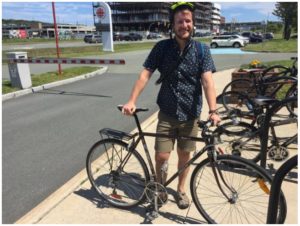‘All occasions I have to talk with people, I take them’ says Martin Laroche

Using his mother’s 30-year-old 12-speed bike, Martin Laroche pedaled 1,600 kilometres from Rimouski, Que., to St. John’s.
But this wasn’t just a leisurely ride — it was the start of his graduate field work on climate change.
If we adapt our policy soon enough we can diminish the effect of these changes.
– Martin Laroche
Laroche recently started his PhD at the University of Quebec in Rimouski, studying the impact of climate change on coastal communities. Instead of staying in a lab, Laroche wanted to connect with the land and the people experiencing climate change firsthand, so he set out on two wheels.
“From time to time [scientists] receive that comment, that we’re disconnected from reality,” said Laroche. “And cycling, I think, it really connects me.”
The whole trek took Laroche just under a month, and on good days he rode more than 150 kilometres. But he said he isn’t planning on biking all the way back, and instead will makes stops along his drive home.
Connecting with people makes for better policy
The people he met along the way were eager to share their experiences, he said. Climate change associated issues, like shifting fishing seasons and coastal erosion, are affecting these communities directly. To Laroche, understanding people’s experience is an important step in implementing effective policy.
“There’s a lot to do about it. If we adapt our policy soon enough we can diminish the effect of these changes, but we have to do it in a very collective way,” he said.
While in St. John’s, Laroche will attend the Coastal Zone Canada Conference later this month. He said he was excited to meet with there different people in the field and search for an interdisciplinary solution.
“The scientific community is very aware of these challenges. A lot of them now are trying to connect with each other, with scientists from different fields, to tackle those very complex problems.”
Continuing conversations in Newfoundland
In his off days, Laroche wants to continue his conversations with people living on the Newfoundland coast.
“All the occasions I have to talk with people, I take them,” said Laroche.
“It’s part of discovering a place, it’s very important to me, and at the same time I can go deeper in my understanding of the coastal zones and challenges that they face.”


